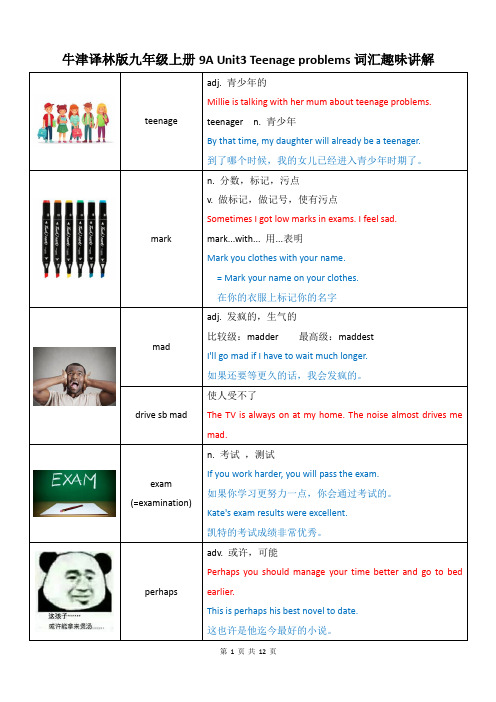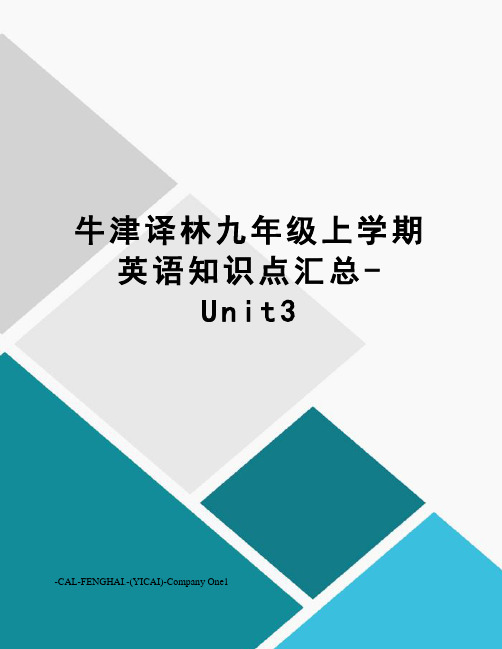江苏 牛津译林版英语 九上 9A Unit3 知识点整理
牛津译林版九年级上册9AUnit3 Teenage problems词汇趣味讲解(配练习含答案)

牛津译林版九年级上册9A Unit3 Teenage problems词汇趣味讲解teenage adj. 青少年的Millie is talking with her mum about teenage problems. teenager n. 青少年By that time, my daughter will already be a teenager. 到了哪个时候,我的女儿已经进入青少年时期了。
mark n. 分数,标记,污点v. 做标记,做记号,使有污点Sometimes I got low marks in exams. I feel sad. mark...with... 用...表明Mark you clothes with your name.= Mark your name on your clothes.在你的衣服上标记你的名字mad adj. 发疯的,生气的比较级:madder 最高级:maddest I'll go mad if I have to wait much longer. 如果还要等更久的话,我会发疯的。
drive sb mad 使人受不了The TV is always on at my home. The noise almost drives me mad.exam (=examination) n. 考试,测试If you work harder, you will pass the exam.如果你学习更努力一点,你会通过考试的。
Kate's exam results were excellent.凯特的考试成绩非常优秀。
perhaps adv. 或许,可能Perhaps you should manage your time better and go to bed earlier.This is perhaps his best novel to date.这也许是他迄今最好的小说。
牛津译林版英语九年级上册9AUnit3单元复习课件

9. worry(n.)担心;令人担忧的事 (v.)担心
6次
→_w_o_r_r_i_ed__(adj.)担心的,烦恼的 ★__w_o_r_r_y_a_b_o_u__t 为……担心 10. reply (n.)答复,回答
② 中 学 生 遇 到 的 烦 恼 并 给 出 建 议 及 做 法 , 如 : 2018 年 盐 城 以 “Building better teamwork”为题,给出建议;2015年泰州要求谈 论自己遇到的烦恼及解决方法。
典例剖析(2018盐城)
Simon是一位学习小组组长,在组织小组活动时,遇到组员不积极 参与的情况。请根据提示,以“Building better teamwork”为题,写一篇 短文,提出你的建议。
_s_o_y_o_u__a_lw__a_y_s_f_e_el__st_r_e_ss_e_d_. 你父母在每一次考试后都太过于关心 你的成绩,所以你总是感觉压力很大。
2019中考常考作文话题突破
命题探索
话题8 人际沟通
徐州近8年中考真题并未考查“人际沟通”这一话题。但分析江苏 其他地市近年与“人际沟通”相关的命题来看,此类话题有以下命题 角度: ① 与 父 母 或 其 他 人 之 间 的 相 处 问 题 , 如 : 2016 年 盐 城 考 查 “ 与 别 人 (朋友、邻居、父母)友好相处”;2014年镇江要求发表关于“希望父 母如何鼓励你”的观点;
注意事项: 1. 词数:100词左右(文章开头已给出,不计入总词数); 2. 文中不能出现真实姓名、校名等信息; 3. 文章必须包含所提供的主要信息,并作适当发挥。
Unit 3 单元复习课件 牛津译林版英语九年级上册

something _w_o_rr_i_es_ him.
v. st句中的连接词(that, if/whether) I often doubt _i_f_/w__h_et_h_e_r
There is no doubt ___th_a_t___ it is worth so much attention.
how
to
s_o_l_v_e__it.
I’m new in this school, so I h_a_rd__ly__ have any close friends. I have
no one to share my joy and w_o_r_ri_e_s_ with. I often d_o_u_b_t__ whether
reply n./v. *和to连用 I received no reply _t_o_ my request. He never r_e_p_li_ed_ __t_o_ any of my letters.
REVISION
words
phrases
(电视)开着
…be on
别无选择只能
have no choice but to do
__w_a_k_i_n_g_ her up this morning.
laugh at sb.
嘲笑别人是不礼貌的。 他宁可被嘲笑也不愿说出真相。 It is impolite to laugh at others. He would rather be laughed at than tell the truth.
Could you please offer me some s_u_g_g_e_s_t_io_n__s__? I think they will
牛津译林九年级上学期英语知识点汇总-Unit3

牛津译林九年级上学期英语知识点汇总-U n i t3-CAL-FENGHAI.-(YICAI)-Company One1Unit 3 Teenage problems知识点归纳一、词组、短语归纳Welcome to the unit1.get enough sleep 得到足够的睡眠2.be on (灯、电视等)开着、亮着,上演3.drive sb mad = make sb mad 把某人逼疯(gomad发疯)4.close friends 亲密的朋友5.feel lonely 感到孤独(主观)live alone 独自居住(客观)6.get low marks in exams 在考试中得低分Reading7.how … deal with…=what… do with…怎样处理……8.have no choice but to do sth 除了做某事别无选择9.stay up (late) 熬夜10.stay awake 保持清醒(作表语、宾语补足语)11.imagine (sb) doing sth 想象、设想做某事12.I often doubt whether / if it is worth spending so much time onhomework(doubt 在肯定句中接if / whether 引导的从句)There is no doubt that you can solve the problem by yourself (doubt 在否定句中接that 引导的从句)13.be (well) worth (doing) sth (很)值得做某事The Summer Palace is worth a visit 颐和园值得一游The picture is worth 20 dollars 这张图片至少值二十美元The book is well worth reading /It's well worth reading the book.这本书很值得一读。
江苏省牛津译林版九年级上册 Unit 3 单词短语句型默写(含答案)答案版

江苏省牛津译林版9AU3单词短语句型默写一、单词默写(单词默写答案,请参照课本)备注:单词表是按照课本设计进行编写的,有需要的老师,可以自行进行删减和调整。
二、短语默写1.变胖get fat2.你怎么啦what’s wrong/the matter?3.吃太多eat too much4.为什么不少吃多锻炼why not eat less and exercise more5.得到足够的睡眠get enough sleep6.有足够多的时间做某事have enough time to do something7.电视机总是开着The TV is always on8.课堂上感觉累feel tired in class9.有亲密的朋友have close friends10.考试中得高分get high marks in exams11.使我受不了drive me mad12.更好得安排你的时间manage your time better13.别无选择,只有做……have no choice but to do……14.熬夜stay up late15.保持清醒stay awake16.准时on time17.值得做某事be worth doing18.梦想……dream of19.给某人提供一些建议offer sb some suggestions/ advice20.收到某人的来信hear from21.对……痴迷be crazy about22.陷入困境get into trouble23.对某人要求严格be strict with sb/ in sth24.在……和……获得平衡achieve a balance between25.算出work out26.根据……according to27.最好做某事it is better for sb to do/ had better do28.对某人很有价值be valuable to sb/ be of great value to三、句型1.I have a problem, but I wonder how I should deal with it.我有一个问题,但是我想要知道我应该怎样处理它。
江苏专版牛津译林九年级上册Unit3知识点总结

江苏专版牛津译林九年级上册Unit3知识点总结译林版九上U3知识点总结1.Hobo,I have a problem.霍波,我有一个问题。
解析:problem是可数名词,意为“难题,问题”。
拓展:(1) have some problems with sth意为“在某方面有些困难/问题”,相当于have some problems (in) doing sth。
例:I have some problems with listening. 我在听力方面有些困难。
(2)No problem. 没问题,没关系。
辨析:problem, question一言辨异:The question is how to solve the Maths problem.问题是如何解出这道教学难题。
2.I'm getting fat. 我正在变胖。
解析:get做系动词,意为“变得”。
例:It is getting colder and colder. 天变得越来越冷了。
拓展:系动词除be以外,还有感官动词look,sound,smell,taste,feel等,及三个“变”。
即get, turn, become.例:She looks worried. 她看起来很焦虑。
3.Why not eat less and exercise more?为什么不少吃多锻炼呢?解析:Why not意为“为什么不”,相当于“Why don't you”,常用来提出建议,后接动词原形。
例:Why not go out for a walk?为何不出去散散步呢?4.I'll finish the food for you then.那么我会替你吃完这些食物。
解析:finish做及物动词,意为“完成”,后接名词、代词或动名词。
例:You must finish your homework first.你必须先完成家庭作业。
牛津译林版英语九上9aunit3welcometotheunit

sion
IfSimon/Kitty/Daniel/Amy/Sandyshares his/herproblemwithyou,whatadvicecanyo ugivehim/her?
Ithink…should…
Ithink…should…
manage manage hertime yourtime betterand betterand gotobed gotobed sleep earlier earlier
Parentsaretoostrict.
getlowmarksinexams
mark分数 exam考试
belaughedat feelsad
parentsworkallday
havenotimeforchildren
feeltired/sleepyinclass notgetenoughsleep
Lifeisfullofproblems.Sostopbeinga ngryandtryyourbesttosolvethem.If youlearnfromproblems,youwillhave successinthefuture.
Readandrecitethedialogue. Finishtherelevantexercises. Previewthereadingpart.
Whatistrouble?
Troubleisafriend.Everybodyhastrouble.E verybodyhasproblems.SodoesEddie.Pleas elookatthepictureandguesswhatEddie’spr oblemis.
Let’slistentotheComicstripandputthepictu resintherightorder. 2 4 1 1
牛津译林版英语九上9aunit3welcometotheunit课件

ቤተ መጻሕፍቲ ባይዱ
What have you remembered?
Eddies tells Hobo that he __h__a_s____ a problem. He is g__e_tt_i_n_g_ _f_a_t__ . Hobo has a look at his stomach and tells him that it’s unhealthy _f_o_r_ him __t_o__ __e_a_t_ too much. Hobo also tells thoim e_x_e__rc_ise _________ more.
Homework
1. Recite the dialogue. 2. Remember the words and useful expressions.
Sometimes I feel lonely. 5. Sometimes I get low _m_a__rk_s_ in exams. I feel sad. 6. My _p__a_re__n_ts____ work all day. They don’t have
time for me.
go to bed early and don't watch too much TV
I get low exams. sad.
My parents work all day. They don’t
have time for me.
1. I don’t get enough ___s_l_e_e_p_. I feel tired in class. 2. I don’t have enough time to do my _h_o__m_e_w__o_r_k. 3. The TV is always on at my home. The _n_o_i_s_e___ almost drives me mad. 4. I don’t have any close _f_ri_e_n_d_s____ to talk to.
- 1、下载文档前请自行甄别文档内容的完整性,平台不提供额外的编辑、内容补充、找答案等附加服务。
- 2、"仅部分预览"的文档,不可在线预览部分如存在完整性等问题,可反馈申请退款(可完整预览的文档不适用该条件!)。
- 3、如文档侵犯您的权益,请联系客服反馈,我们会尽快为您处理(人工客服工作时间:9:00-18:30)。
牛津英语9A Unit3 知识点一、重点词汇和短语1.too much太多2.in class在课上3.drive sb mad使某人疯狂4.feel lonely感到孤独5.all day整天6.feel sleepy瞌睡的7.deal with处置;处理8.have no choice but to…没有选择只能……9.stay up熬夜10. hand in上交11. feel bad about sth对……感到难过12. be worth doing值得做某事13. dream of/about梦想;想象14. hear from收到某人的来信15. be crazy about对……感到疯狂16. worry about担心17. get into trouble陷入麻烦18. be strict with sb对某人要求严格19. stay out待在户外;(晚上)不回家20. look forward to渴望21. make sure确保;确认22. in one's mind在某人的想法中23. make a list of列出24. work out算出;解决25. according to根据26. agree with同意27. instead of代替;而不是28. youth worker青少年辅导员29. on show上演30. end with结束31. laugh at嘲笑32. go over复习;回顾33. don't mention it不客气34. keep sth to oneself秘而不宣35. be of sb's age与……同龄的36. eat less and exercise more少吃多锻炼37.have enough time to do sth 有足够的时间做某事38. drive sb mad使某人发狂39. have no choice but to do sth 除了做某事以外别无选择40. stay awake保持清醒41. offer sb some suggestions给某人提供一些建议42. develop our hobbies培养我们的爱好43. achieve a balance获得平衡44.solve the problem解决问题45.pay no attention to 不理睬46.seem much happier显得更加高兴47.make progress in在……上取得进步48.be of sb’s age与……同龄二、重要语言点1.I have a problem, but I wonder how I should deal with it.我有一个问题,但是我想要知道我应该怎样处理它。
(1) wonder①wonder作及物动词,表示“想知道”、“对……感到怀疑”、“纳闷”,常见用法有:1)后接who,what,when等引导的宾语从句。
相当于want to know,比如:I wonder who he is.我想知道他是谁。
2)后接that引导的宾语从句,表示“感到惊奇”、“对……感到惊讶”,that常可省去。
比如:I wonder( that) Luneng lost the game.我对于鲁能队失掉比赛很惊讶。
3)后接if或whether引导的宾语从句,用于有礼貌的询问。
如:She wondered whether her mother was free that morning.她想知道那天早上她的妈妈是否有空。
4)后接“疑问词+不定式”构成的短语。
如:I'm just wondering how to do it.我想要知道怎样做。
②wonder作名词,表示“奇事”、“奇迹”、“奇观”、“奇才”、“惊奇;惊讶”等。
如:The pyramids are one of the Seven Wonders of the World.金字塔是世界七大奇迹之一。
(2) deal with与do with都意为“处置;处理”。
do with常与连接代词what连用,而deal with常与连接副词how连用,比如:I don't know how they deal with the problem.(=I don't know what they do withthe problem.)我不知道他们如何处理这个问题。
He is easy to deal with.(=He is easy to do with.这时“do”是不及物动词)他是容易相处的人。
这两个词组在使用时有细微的差别。
2.I have a lot of homework every day, and I have no choice but to finish all of it.我每天有很多作业,我没有选择只能完成所有的作业。
choice作名词,意为“选择”,其动词形式为choose。
常见短语为have no choice but to do sth 意为“没有别的选择只能做”。
I have no choice but to accept his invitation.我除了接受他的邀请没有别的选择。
3.I often have to stay up late.我常常不得不熬夜到很晚。
stay up意为“熬夜”,后常接副词late。
Do you often stay up late?你常常熬夜到很晚吗?[归纳]常见的含有up的动词短语:send up发出,射出put up张贴/建造finish up吃完或喝完divide up使……分开come up with想出eat up吃光give up放弃4. However, I hardly have any spare time for my hobbies.然而,我几乎没有任何空余时间来享受自己的爱好。
hardly意为“几乎不”,易混词为hard,可为形容词或者副词。
作形容词时,意为“困难的”;作副词时,意为“努力地;猛烈地”。
As a student. we should work hard.作为学生,我们应该努力学习。
5.I often doubt whether it is worth spending so much time on my homework.我常常怀疑把这么多时间花费在作业上是否值得。
(1) doubt意为“怀疑”。
后接宾语从句时,如主句为肯定句时用if或whether连接,如主句为否定句或疑问句时用that连接,表示“不信任,不相信,怀疑,疑惑”。
比如:I don't doubt that she's telling the truth.我并不怀疑她讲的是真话。
(2) worth为形容词,意为“值得;值……钱”常见短语为be worth doing“值得做”。
The Life I Know, by Han Han is worth reading.韩寒写的《我所理解的生活》值得读。
6.I don't understand why they were so strict with me.我不理解为什么他们对我如此的严格。
strict作形容词,意为“严格的;严厉的”。
常见短语be strict with sb,意为“对某人严格要求”be strict in( doing) sth,意为“对(做)某事严格要求”。
比如:Mr Smith is very strict with his children.史密斯先生对他的孩子们要求十分严格。
7.I need someone to share my worries with.我想要一个人来和我分担忧虑。
worry:(1)worry作名词,意为“担心;令人担忧的事情”,其复数形式为worries。
Too many worries are bad for your health.太多的忧虑对你的健康有害。
(2) worry可作及物动词,意为“使烦恼”,“使焦虑”,常接sb作宾语。
如:What worried you so much? 什么事使你这么着急?(3) worry也可作不及物动词,意为“烦恼”、“担心”、“发愁”,常跟介词about或over。
比如:They are worrying about the coming exam.他们正在为即将到来的考试而发愁。
(4) worry后接从句时,也表示“为……担心”,此时不用介词,worry可看作及物动词。
比如:Don't worry how much you 'spend.别担心花多少钱。
8. How about reading English aloud every morning?每天早上大声读英语怎么样?aloud adv.大声地;出声地。
[辨析]9.Try to pronounce all the words correctly.尽力拼读正确所有单词。
pronounce意为“发音”。
其名词形式为pronunciation意为“发音;读音”。
Can you pronounce all the new words correctly?你能正确地发所有新单词的音了吗?10. You are unhappy with your weight, but you do not know how to change it.你对于自己的体重不满意,但是你不知道怎样改变它。
unhappy为形容词,意为“不快乐的;不满的”。
它是由happy加否定前缀un变化而来的。
I could no longer ignore the fact that he was deeply unhappy.我再不能对他深感不快这个事实不闻不问了。
[归纳]加前缀un:un-前缀很灵活,它可以加在形容词、过去分词、现代分词前面构成具有否定意义的形容词:able(adj.能够……的)-unable(adj.不能够……的)comfortable(adj.舒服的)-uncomfortable(adj.不舒服的)acceptable(adj.可接受的)-unacceptable(adj.难以接受的)doubted(adj.怀疑的)-undoubted(adj.无疑的)11.I dream of a long holiday so that I could have more time for my hobbies.句中的so that用来引导目的状语从句,常与may,can,will等连用,意为“为的是”,相当于“in order that”。
